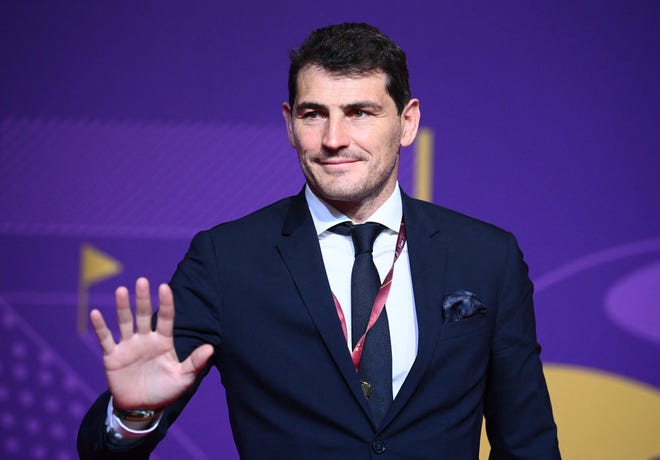There is never anything funny or clever about bigotry.
It was classless and immature for Spanish soccer legends Iker Casillas and Carles Puyol to suggest they are gay as a joke in a pair of Tweets on Sunday. That they pulled this stunt about a month before a World Cup in a country where being gay can get you killed was also the height of irresponsibility.
The Tweets were deleted, and Casillas later said he’d been hacked. Of course. God forbid he should own his ignorance or take responsibility for subjecting people who are already the target of hate and discrimination to more of it. Puyol at least acknowledged he’d been wrong, apologizing for his poor taste and insensitivity.
But Casillas and Puyol’s initial Tweets, and the nasty responses to them, were a reminder of how entrenched homophobia remains in men’s soccer, and will no doubt give LGBTQ+ players pause if they were thinking about coming out while they’re still playing.
“It’s a difficult journey that any LGBTQ+ ppl have to go through. To see my role models and legends of the game make fun out of coming out and my community is beyond disrespectful,” Josh Cavallo, the Adelaide United defender who is one of the few openly gay men currently playing professional soccer, said on Twitter.
His Tweet was retweeted by Jake Daniels, who in May became the first openly gay man to play in English professional soccer in 30 years.
Soccer likes to tout its inclusivity, pointing out that it’s played in all corners of the world. FIFA makes a production of its anti-discrimination campaigns – you can be assured there will be some grand display before every game at the men’s World Cup that begins Nov. 20 – and has oh, so benevolently allowed national team captains like Manuel Neuer of Germany and Harry Kane of England to wear rainbow armbands in a show of support for the LGBTQ+ community.
But there is an ugly underside to the beautiful game that goes beyond Casillas and Puyol, and the most influential voices of the game – FIFA, national federations, big-name players and coaches – must do more both to stamp it out and create a welcoming environment for LGBTQ+ players.
NEWSLETTER: Get the latest sports news straight to your inbox

Every week, it seems, a Black or brown player complains of racist abuse during games or on social media and more often than not the response is a shrug. Mexico fans continue to chant a homophobic slur at opposing goalkeepers and FIFA refuses to impose the kind of substantial penalty – forfeiture of World Cup qualifiers – that would have a meaningful impact.
Atlanta United’s Santiago Sosa and the Columbus Crew’s Cucho Hernandez were the latest players to be suspended by Major League Soccer for using homophobic slurs. Kick It Out, the London-based organization that tracks bigotry in English soccer, said it received 132 complaints of abuse based on sexual orientation last season, two more than in 2019-20, the last season with fans, and second only to racial abuse.
And next month, FIFA will take its crown jewel, the men’s World Cup, to a country where LGBTQ+ people can be imprisoned, even stoned, just for being who they are.
It was in this environment that Casillas and Puyol thought it was OK to make a joke of being gay, reportedly as a means of deflecting the obsessive attention over Casillas’ personal life since his divorce.
“I think the gay community has become used to being a punching bag. And we’re used to stupid stuff like this,” Cyd Zeigler, the co-founder of Outsports.com, told USA TODAY Sports.
“I want to get to a place where being gay, particularly in sports, is such a non-story that this isn’t even offensive,” Zeigler added. “I want us to not feel upset about this, that this is just another dumb joke and we are in a place in society where we can hear and laugh at those jokes. We aren’t quite there yet. Particularly in Qatar, we’re definitely not there yet.”
Zeigler said, for him, the Tweets by the cornerstones of the Spain team that won the 2010 World Cup weren’t as offensive as an athlete saying he hates gay people or calling an opponent a slur. But anything that contributes to making gay athletes feel unwelcome, anything that emboldens people to attack or marginalize others for being their authentic selves, needs to be called out.
A person’s sexual orientation – or race or gender – is nothing to make light of. Doing so can lead to psychological damage and, in some parts of the world, physical harm. Casillas and Puyol shouldn’t need to be reminded of that.
Sadly they, and too many others, still do.
Follow USA TODAY Sports columnist Nancy Armour on Twitter @nrarmour.








